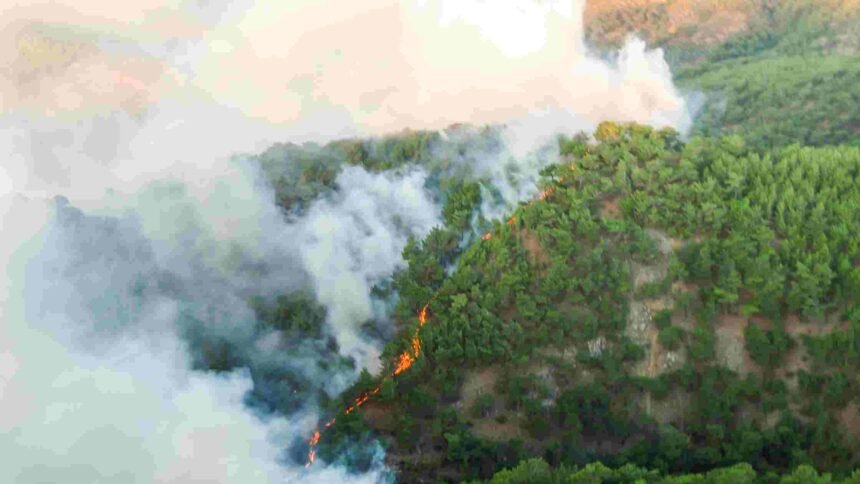The Food and Agriculture Organization (FAO) of the United Nations has expressed significant concern over the alarming rise in forest fires globally. According to recent data, approximately 340 million to 370 million hectares of the Earth’s surface are consumed by forest fires annually, a figure that is projected to increase by 50 percent by the end of this century. This disturbing trend underscores the urgent need for comprehensive fire management strategies.
The FAO’s press release, issued today, highlights that climate change is exacerbating conditions conducive to forest fires. Increasing droughts, rising temperatures, and strong winds are expected to amplify the intensity and duration of these fires. As a result, the number of extreme forest fires could surge dramatically, with severe implications for sustainable development and environmental stability.
ALSO RREAD –land-conservation-measures-markedly-reduce-deforestation-in-the-brazilian-amazon
Zhimin Wu, Director of FAO’s Forestry Division, emphasized the critical importance of addressing forest fires in light of these projections. During the 9th World Forest Week in Rome, Wu launched new guidelines aimed at enhancing global fire management efforts. These guidelines integrate scientific advancements with traditional knowledge, emphasizing the need for proactive measures before, during, and after fire events.
The FAO recommends that countries adopt strategic actions involving local communities and leveraging their traditional knowledge in fire management decisions. This inclusive approach is designed to ensure the prevention of forest fires, the rapid containment of outbreaks, and the restoration of areas ravaged by severe burns. The guidelines also advocate for the active participation of women and the promotion of diverse fire management knowledge to develop new alternatives and solutions.
Historically, FAO issued guidelines on managing forest fires around 20 years ago, which many countries used to formulate public policies and training programs. The new guidelines represent the first activity of the Global Fire Management Hub, a joint initiative by FAO and the United Nations Environment Programme (UNEP) launched in 2023. This hub aims to unite the global fire management community and strengthen national capacities for integrated fire management strategies.
The Fire Hub, supported by the governments of Canada, France, Germany, Portugal, the Republic of Korea, and the United States, has received $5 million in funding. Key partners include the Canadian Forest Service, the German Federal Ministry of Food and Agriculture, the Korea Forest Service, the Portuguese Agency for Integrated Rural Fire Management, and the U.S. Forest Service and USAID.
In addition to FAO’s guidelines, a new report by UNEP and GRID-Arendal titled “Spreading like Wildfire: The Rising Threat of Extraordinary Landscape Fires” calls for a radical shift in government spending on wildfires. The report advocates reallocating investments from reaction and response to prevention and preparedness. It suggests that two-thirds of wildfire-related spending should focus on planning, prevention, preparedness, and recovery, leaving one-third for response. Currently, direct responses to wildfires consume over half of related expenditures, while planning receives less than one percent.
The UNEP report warns that climate change and land-use changes will make wildfires more frequent and intense, with a global increase of extreme fires by up to 14 percent by 2030, 30 percent by 2050, and 50 percent by the end of the century. This elevated risk extends even to regions previously unaffected by wildfires, such as the Arctic.
Wildfires have a disproportionate impact on the world’s poorest nations, hindering progress towards the UN Sustainable Development Goals and deepening social inequalities. The health impacts of wildfire smoke, including respiratory and cardiovascular issues, disproportionately affect the most vulnerable populations. The economic costs of rebuilding after wildfires can be overwhelming for low-income countries, and the environmental damage, including watershed degradation and soil erosion, poses long-term challenges.
Moreover, wildfires and climate change are mutually exacerbating. Wildfires worsen climate change by destroying sensitive and carbon-rich ecosystems, such as peatlands and rainforests, turning landscapes into tinderboxes and making it harder to control rising temperatures. Conversely, climate change intensifies wildfires by increasing droughts, high temperatures, low humidity, lightning, and strong winds.
The report emphasizes the need for better understanding of wildfire behavior and the importance of adaptive land and fire management. It calls for policies, legal frameworks, and incentives that encourage appropriate land and fire use. Ecosystem restoration is highlighted as a crucial strategy to mitigate wildfire risks and rebuild better after fires. Examples include wetlands restoration, reintroduction of species like beavers, peatlands restoration, maintaining distance between buildings and vegetation, and preserving open space buffers.
Finally, the report stresses the importance of international standards for the safety and health of firefighters. It calls for measures to minimize the risks firefighters face, including awareness of smoke inhalation dangers, reducing life-threatening entrapments, and ensuring access to adequate hydration, nutrition, rest, and recovery.
Follow Climate India for more Environmental News. Connect with us on Facebook, Twitter, Instagram, and YouTube




